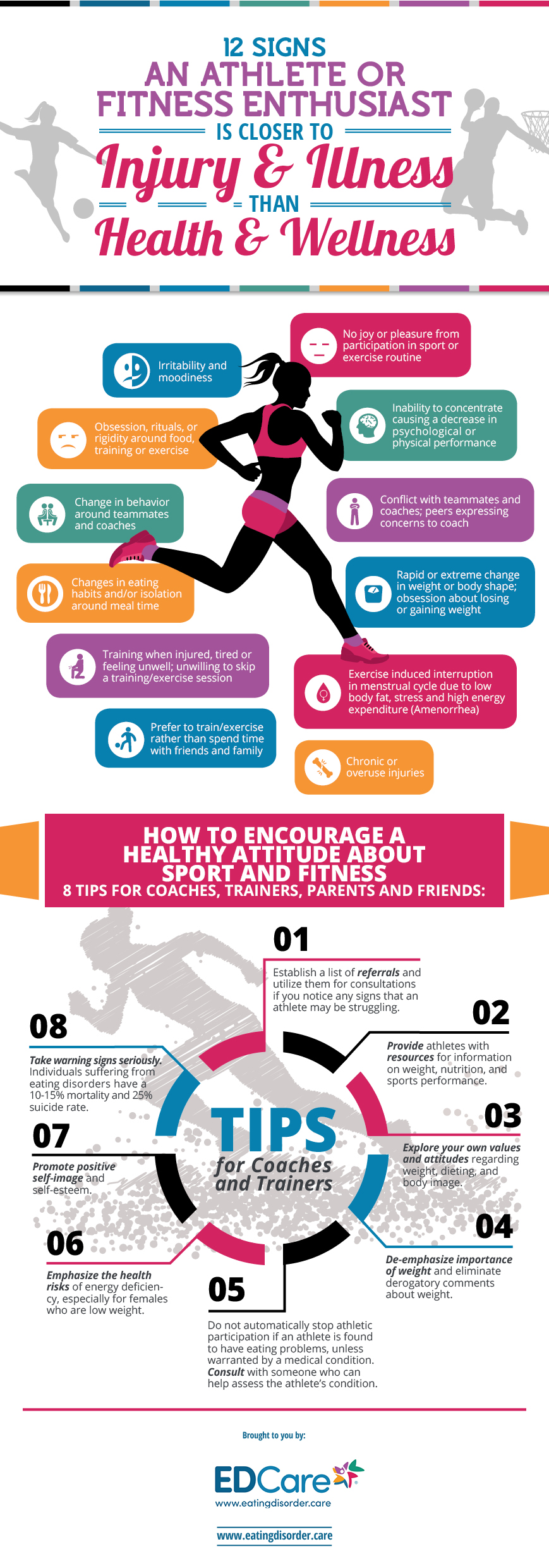
How to Know When “Healthy” Becomes Dangerous
 Regular physical activity is a key part of a healthy lifestyle. But when a young athlete takes fitness and training to the extreme, this behavior can quickly become unhealthy. In some cases, it can put individuals at risk for serious injury or even permanent harm. Parents, peers, and instructors alike must learn to recognize certain warning signs. That’s because they may indicate an imbalanced or obsessive attitude toward sports and physical fitness. It’s also imperative that influential figures in athletes’ lives know how to encourage a truly healthy lifestyle.
Regular physical activity is a key part of a healthy lifestyle. But when a young athlete takes fitness and training to the extreme, this behavior can quickly become unhealthy. In some cases, it can put individuals at risk for serious injury or even permanent harm. Parents, peers, and instructors alike must learn to recognize certain warning signs. That’s because they may indicate an imbalanced or obsessive attitude toward sports and physical fitness. It’s also imperative that influential figures in athletes’ lives know how to encourage a truly healthy lifestyle.
Warning Signs
1. Irritability and general moodiness.
2. No joy or pleasure from participation in sport or exercise.
3. Obsessive tendencies, rituals, or rigidity pertaining to food, exercise, or training.
4. Behavioral changes around teammates and coaches.
5. Conflict with teammates and coaches or expressions of concern from teammates.
6. Shifts in eating habits or isolation at mealtimes.
7. Unwillingness to skip a training or fitness session, especially when tired, unwell, or injured.
8. Chronic injuries or consistent overuse while injured.
9. Choosing training/exercise rather than spending time with friends or family.
10. Inability to concentrate, leading to a decrease in physical or mental performance.
11. Extreme or rapid change in body weight or shape; obsessive behavior over losing or gaining weight.
12. Loss of menstrual cycle due to low body fat, high stress, and high energy expenditure caused by exercise. Amenorrhea is the medical term for this.
The presence of only one or two of these warning signs may not indicate the presence of an ongoing health problem. But these concerns deserve serious attention no matter what. By intervening and addressing issues early on, trusted adults and friends could potentially save a loved one’s life. Individuals who suffer from eating disorders have a 10-15% mortality rate and a 25% suicide rate. So taking action right away is imperative.
Body Positivity
Family, friends, and coaches can also take steps to emphasize body positivity and a more balanced approach to exercise and physical appearance. By promoting a positive self-image and self-esteem in young athletes, minimizing the importance of weight, and stressing the idea that one’s weight does not automatically equate to health or attractiveness, impressionable athletes can learn to adopt a healthier attitude toward their physical activity and own self-worth.
In addition, one’s own attitudes pertaining to weight, body image, and dieting may be worth exploring. Unfortunately, these attitudes begin at an early age and can easily permeate others without our realizing it. Eliminate any derogatory comments about weight from your communications with others and within your own thoughts.
Engaging with Skilled Professionals
Finally, it’s important to provide valuable information about nutrition, physical activity, and athletic performance to these fitness enthusiasts. Establish your own list of professionals in the field. Then you will be ready to refer young athletes if you see them struggling. Refer to helpful publications. Emphasize health risks associated with energy deficiency (especially for low-weight females). And offer resources on these topics frequently. But most importantly, coaches who feel an athlete may be struggling with an eating disorder should consult with a professional. An early assessment may be preferable to automatically putting a stop to athletic participation.
Certainly, we all hope we will never have to encounter such situations. But it’s vital to recognize the signs and take action if and when they appear. Assuring young athletes that what’s on the scale or how they perform in a game does not measure their worth is vitally important. By doing so, trusted adults and friends can make a measurable difference in their lives.
For further perspective, click here.
Today’s guest post comes from our friend Kim Travis, Director of Marketing at EDCare in Denver, CO.
Running Shadows II, photograph © amira_a / flickr
Subscribe by email to follow the accumulating evidence and observations that shape our view of health, obesity, and policy.
July 3, 2018
